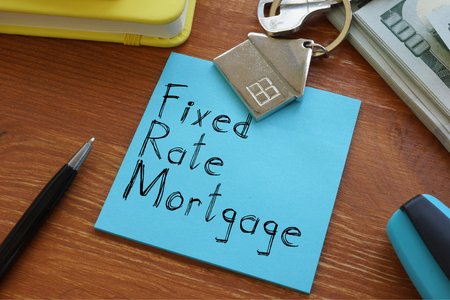Welcome To Our Mortgage Educational Blog About:
Fixed-Rate Mortgages

A Fixed-rate mortgage, like the name implies, is a home loan that employs a fixed interest rate throughout the mortgage term. In other words, the interest rate remains constant from start to end, and best suit customers who wish to know how much they owe every month.
Currently a huge percentage of customers prefer fixed-rate mortgages to other arrangements out there. Why? There’s only one way to find out. – read on!
Types of Fixed-Rate Mortgages
Each type of fixed-rate mortgage loan has its share of benefits. Fixed rate mortgages are in fact the most common type of mortgage in Canada. In this article, we’ll focus on the two most common fixed-rate mortgages: the 5-year fixed-rate mortgage and the 10-year fixed-rate mortgage. Let’s dive deeper and see what each entail.
1. 5-year Fixed-Rate Mortgage
The 5-year fixed rate mortgage is by far the most common among the two. That may perhaps be as a result of the payback amount being spread out over the 25 years resulting in reduced payments – the longer the term, the lower the monthly costs.
Most borrowers prefer this type of mortgage because of its payment stability. In other words, the monthly payments don’t fluctuate but are rather fixed for 5 years irrespective of market conditions. By offering the long-term stability, this loan arrangement makes it easier for homeowners to reliably budget for other expenses. After the 5 years are up, the mortgage is renewed at the current market rates.
2. 10-Year Fixed-Rate Mortgage
A 10-year fixed-rate mortgage, on the other hand, runs for 10 years. It may prove an ideal arrangement for some borrowers, particularly those who wish to build equity in their property quicker and at relatively cheap interest rates.
Additionally, a 10-year fixed-rate mortgage delivers the same payment stability as a 5-year fixed-rate mortgage. The 10-year fixed-rate is not nearly as popular as the interest rate is higher than its alternative, the 5-year fixed-rate. Only around 2% of Canadians have a mortgage term longer than 5 years,
3. Other Fixed-Rate Mortgages
Depending on the loan provider, you may come across additional fixed-rate terms that get along with your requirements. For instance, you might want a loan that strikes a perfect balance between the interest-saving benefits of a 5-year fixed-rate mortgage and the long term stability of a 10-year fixed-rate loan.
In this case, a shorter team mortgage (less than 5 years) can prove an excellent compromise. Did you know that your mortgage term could be as short as a few months? Some mortgage lenders offer you the luxury of many different fixed rate terms that can be aligned to your financial goals. Make sure to keep in mind that the length of your mortgage term has an impact on your interest rate, penalties if you break your mortgage, and when you will need to renew your mortgage.
Pros and Cons of a Fixed Rate Mortgage
Fixed-rate mortgages may seem appealing to the borrower, particularly those that are new in the market. Their low-interest rates make it more alluring and worth considering for borrowers.
How about we look at some of the pros and cons before coming to this consideration?
Pros
- You enjoy the luxury to choose a preferred fixed-rate term, often between a few months and 10 years to give you mortgage stability
- The interest rates remain the same no matter what changes occur in the market during your term
- Your peace of mind and security is guaranteed since you are aware of how much you’ll incur in total over the specified loan period
- You could save a lot of money by fixing the interest rate for your term at a lower rate
- It’s easy to come across great fixed term arrangements as most loan providers compete using the interest rates they charge on their mortgages
Cons
- Committing to a fixed-rate mortgage loan means losing your flexibility. You will be required to stay in your current home throughout the fixed mortgage term. Though transferable, doing so can attract some hefty costs as you’ll be breaking your mortgage term.
- Despite the fixed interest rate idea seeming like a better idea, you will end up falling on the losing end if the interest were to subside – keep in mind that your rates remain the same throughout the term. As a result, you might end up paying more than you would in a different arrangement.
- Fixed-rate mortgage loans attract expensive arrangement fees that may come as a surprise to any homeowner. The costs may be reasonable for say, a 5-year fixed-rate term but you might want to watch out if you wish to commit to a two or three-year fixed-rate mortgage.
- Some lenders may impose terms on seemingly appealing fixed interest mortgages that can prove prohibitive and extremely costly.
- If you are working with a mortgage broker like me, you have no need to worry about the cons as it is my job to look out for your best interests!
How a Fixed Rate Mortgage Works
Fixed-rate mortgages aren’t affected by what happens in the market. They have an interest rate that remains constant throughout your mortgage term. And even in situations that force the market interest rate to fluctuate, the fixed-rate interest isn’t altered.
As mentioned earlier, the mortgage term can vary, depending on how long you agree with the lender to pay it back. The most popular term option for a fixed rate mortgage in Canada is the 5-year fixed-rate mortgage.
But mortgage terms aren’t just limited to the two options. Across Canada, fixed-rate mortgage periods tend to range from a few months to 10 years.
How Long Does It Take to Repay a Fixed Rate Mortgage?
The amount borrowed and the length of your mortgage are the two most important elements in calculating your monthly payments. In most cases, the longer the period, the lower the monthly cost, which explains why the 25-year amortization period is the most popular as it stretches your mortgage over 25 years.
A mortgage calculator is a reliable tool when looking to compare the different fixed-rate mortgage types and lenders, after deciding on loan amount you wish to commit to.
A 20% down payment is recommended. That’s mostly because if your down payment is less than 20%, you will be required to have mortgage insurance (CMHC), which would certainly up your monthly payments. But just like with traditional loans, your principal and interest payments make up the total mortgage amount to ought to pay.
Conclusion
Fixed-rate mortgage loans are a good idea, especially for the landlords or homeowners who may not want to take the risk of an increase in interest rates, which often result from changes in the market.
Borrowers, however, are advised to ensure they first understand all the terms accompanying fixed-rate mortgages before accepting the deal. The low-interest rates may be appealing but sometimes you’ve got to relax and remember that ‘when the deal is too good, think twice,’ they say. In other words, ensure you note all the facts and work with a mortgage broker to ensure your best interests are always taken care of!
Are you ready to purchase a home? Reach out to me directly or start your application here: www.sandraforscutt.ca/mortgage-application/
Don’t hesitate to contact us with any questions you may have.
Recent Educational Blogs
Thinking About Flipping a House in Edmonton?
May 2025 | Flip Mortgage ProgramAre you eyeing that “fixer-upper” in Edmonton and dreaming of turning it into a showstopper? House flipping is more popular than ever, and with the right mortgage program, it’s easier to get started than you might think!What is a Flip...
Unlocking the Value in Your Home
April 2025 | Home Equity Unlocking the value in your home can be a smart way to fund major renovations or get a handle on high-interest debt. If you’ve built up equity—the difference between your home’s current value and what you still owe on your mortgage—you may be...
To Refinance or Not to Refinance: Navigating Mortgage Renewal in 2025
March 2025 | To Refinance or Not to RefinanceAs mortgage renewal season approaches, many homeowners are grappling with a critical question: Should I refinance my mortgage? With interest rates higher than what many locked in years ago and looming financial pressures...



